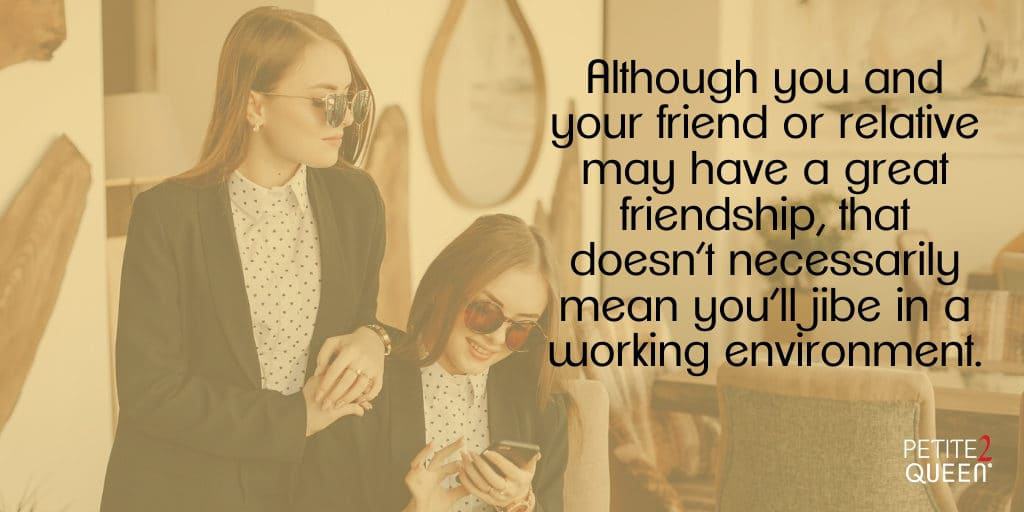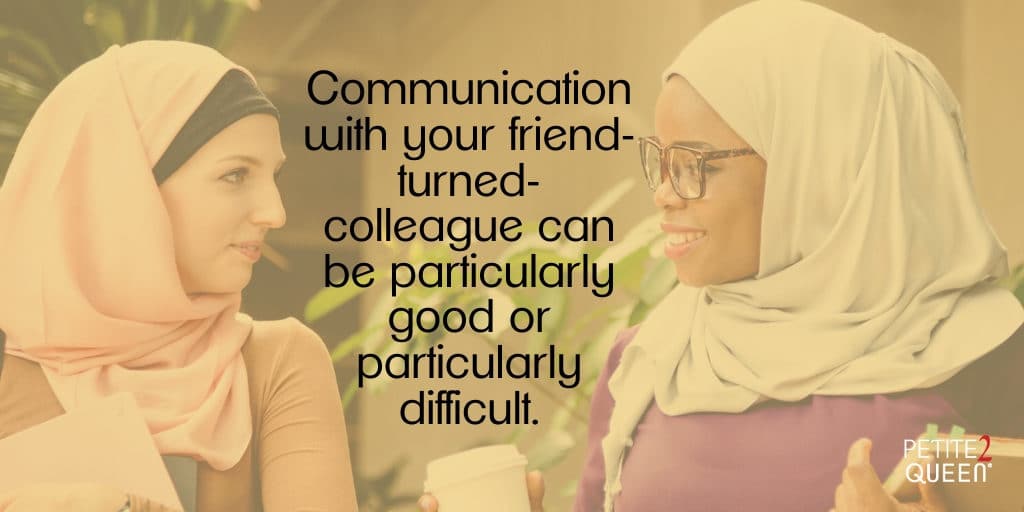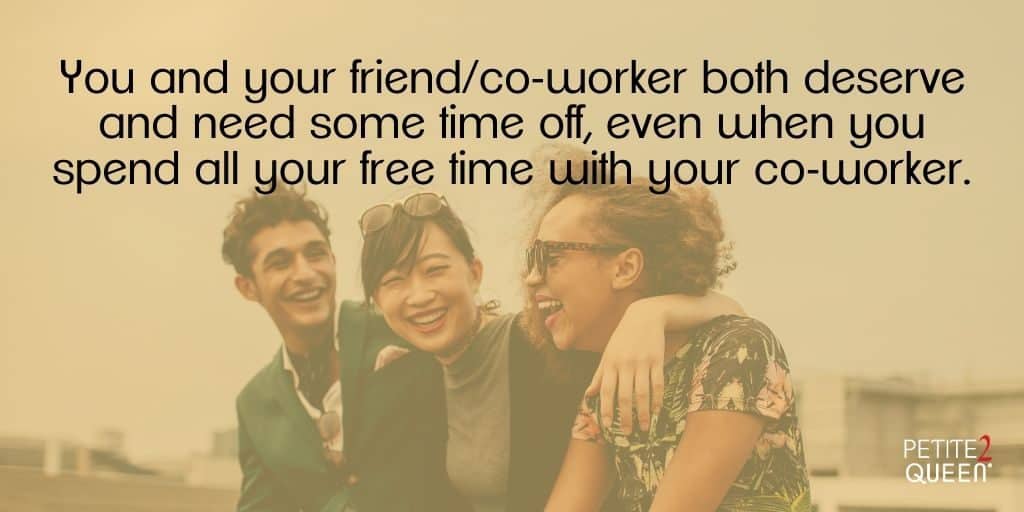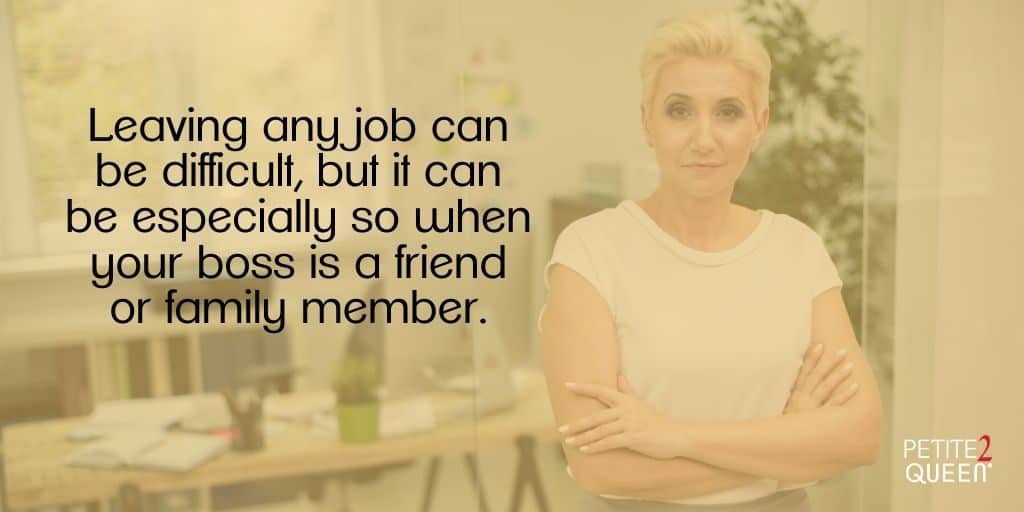Have you ever wondered what it would be like to work with your best friend? You may envision the two of you dominating those workplace projects, enjoying lunch breaks together, and sharing inside jokes about your other co-workers. Working with friends or family can be a great experience, but it isn’t for everyone. Not all friendships do well when dropped into a professional environment.
Here at Petite2Queen, three of my co-workers are either friends or family members. I work for my aunt, who started the company and serves as CEO. My sister and best friend both also work here. I interact with all three on a daily basis – not just at work, but also in my free time, too. It can be a lot to juggle these personal and professional relationships, but I’m fortunate that in my case, all three are running smoothly. I get along great with all of them, and in general, we all work well together.
My experience doesn’t mirror everyone’s, though. I know a guy who worked with his father, and it didn’t turn out very well. Within a few months, he decided to work elsewhere. While they got along personally, working together proved to be too much for them.
So, is working with friends and family a good idea? Or is it a recipe for disaster?
It Depends
As with nearly any open-ended question, the answer may not satisfy you: It really depends. There are so many different factors at play here that it really comes down to how two individuals fit together.
Although you and your friend or relative may have a great friendship, that doesn’t necessarily mean you’ll jibe in a working environment. Some personalities mix well, but others will face an uphill battle. Because we all have different working styles, a solid personal relationship doesn’t mean you think or do things the same way at the office. These differences can lead to unexpected difficulties.

How you work together also will be influenced by the nature of the working relationship. Will you be reporting to your friend (or vice versa)? Or will you both be equals in the company and work side-by-side on projects? Unequal statuses within the company can come with its own set of issues.
Many people say that nothing destroys a friendship like choosing to live together, and the same can be said about working together. But as with all phrases of “common knowledge,” it doesn’t apply to everyone. It really comes down to how your individual personalities mix – both in the office and out of it.
Here are some areas to watch out for as you embark on a professional relationship with a close friend or relative.
Discordant Working Styles
First and foremost, you and your friend may very well find that you have completely different working styles. Perhaps you’re neat and orderly, with all your supplies put away in their respective drawers and all your documents filed into well-marked folders on your computer. In contrast, your friend is disorganized and messy, with her desk in disarray, files hard to find or even missing, and trash cluttering her space. How she keeps her work environment is her business, but it can be a problem if you share the same space and it’s hindering your ability to do your job.
Or maybe your friend is always early to her meetings, and keeps her tasks rigidly managed hour-by-hour. You, on the other hand, may be more adaptive, using alternate tools and methods to stay on track. You and your friend may butt heads, especially if either of you have difficulty adjusting your working styles.
Finally, you may notice that your workplace friend has a completely different way of managing professional relationships. While the two of you get along well personally, it can be shocking to find that your friend is negative, passive, or overtly aggressive in her other inter-office relationships. How does her interaction with others affect you? Does it leave you feeling uncomfortable or offended?
Those are just some of the issues that may arise between you and your friend-turned-colleague. If you run into these problems, be prepared to discuss them frankly in an effort to alleviate the discordance.

Communication Complications
Another big hurdle you’re likely to face is a difference in communication styles.
On the one hand, communication between you and your friendly co-worker can be better and easier than communication with people you only interact with at work. You already understand each other’s communication styles and can likely be more honest and direct with feedback or concerns. There might be less concern about hurt feelings if you’re displeased with their work.
On the flip side, though, there’s a lot more room for hurt feelings. Emotions can interfere with your day-to-day work, and professional feedback can be taken personally. If you’re mad at your friend for a personal reason, that could impact your communication while on the job. Furthermore, you may shy away from giving negative feedback about your friend’s work for fear of it impacting your personal relationship.
In short, communication with your friend-turned-colleague can be particularly good or particularly difficult. It really depends on how well you get along and how well you can differentiate your personal and professional lives. It may be a skill you need to develop over time.
Work-Life Unbalance
While working with your best friend can introduce new obstacles in the workplace, it can also result in an unexpected difficulty outside of it: an out-of-whack work-life balance. Work can intrude on your personal life when you both have the same job! It can go beyond persistent talk about workplace woes and triumphs. Consider this: You go to dinner together on a Saturday night, and your friend wants to brainstorm for the next work project. No thanks!
It’s easy for your personal relationship to bleed into your professional life, and it’s just as easy for your working experiences to bleed into your evenings and weekends. It can negatively impact your work-life balance.
If you notice this becoming an issue, you and your friend should agree to strict boundaries. Be ready to set each other straight if one of you brings up something at the wrong time! You both deserve and need some time off, even when you spend all your free time with your co-worker.

Effects on Your Relationship
Like it or not, your working relationship will likely have some effects on your personal relationship. This can be a good thing or a bad thing.
If you work well together, your shared job can nurture your relationship. It may bring out a new side of you both that fits really well. You may learn new things about each other and the way you think. It may also simply be nice to spend so much more time together, even if it is while focusing on professional tasks. In my own experience, working with my sister has been wonderful. It’s strengthened our relationship, and I’m grateful that we work so well together.
Unfortunately, not everyone is so lucky. Some people, no matter how well they get along as friends or relatives, simple don’t see eye-to-eye in the workplace. Your professional interactions can bring out the worst, simply because you have different working or communication styles. Having a negative experience with them as a co-worker or manager can damage the personal relationship.
If you feel that your friendship is deteriorating, talk to your friend about how you can ease those issues. You should both keep in mind that your professional roles don’t need to impact your personal lives. Keep work and life separate as much as you can. But if it proves too difficult, it may be time for one of you to switch jobs – whether by moving to another department or another company. You don’t want to ruin a good relationship, and if you’re both mature and open-minded, it should be easy to salvage.
Career Path Pros & Cons
If you work for a family member or friend, you’ll have a whole new set of issues to consider. You might enjoy more relaxed treatment than you otherwise would: there may be more flexibility in your working hours and availability, or you could be more easily forgiven for minor mistakes. Likewise, you may also have better job security. It can be related to higher trust in you, or a desire to help out a friend or relative.
A word of caution: You don’t want to inadvertently take your personal relationship for granted or take advantage of it. Although you may get away with things that wouldn’t fly with other bosses (for example, sleeping too late or forgetting about a meeting), it’s important to always maintain your professionalism. You shouldn’t expect special treatment, and even if you do get it, work hard so that you’re truly earning it.

Another negative impact you may encounter is others’ trust in you. If you’re working for your dad or everyone knows your best friend got you the job, other employees may perceive you as unworthy or unqualified. They may think you didn’t earn the job or it was handed to. This can impact you at the company, but it can also come up if you seek other employment. Hiring managers may be wary about your true qualifications.
Moreover, this worry about special treatment may actually result in higher standards from your family member. Your relative may treat you more harshly and hold you to a greater standing, in part in an effort to offset others’ doubt in your qualifications or professionalism. Things that other employees do without consequence may leave you in hot water. It can be exhausting to be expected to meet this higher standard of performance, and it will feel unfair.
Hurt Feelings When Leaving the Job
Most jobs don’t last forever, and there may be a time when you’re ready to find employment elsewhere. Leaving any job can be difficult, but it can be especially so when your boss is a friend or family member. Although it’s a professional decision, they can take it personally. They may wonder why this business isn’t good enough for you, or think you weren’t grateful for the employment they offered. They may be personally offended or even angry that you’re leaving their company for another one.
Be prepared for a rocky relationship as you transition to your new job. You and your relative will most likely patch things up in no time, and you may not be burdened with any hard feelings at all. Just know that, when professional and personal decisions cross, feelings may get hurt. Let your relative know that the decision had nothing to do with them and was solely about your own career goals. They’ll understand that it was a professional decision, not a personal one.
Is Working with Friends Right for You?
Before jumping into a new job with your best friend or family member, it’s a good idea to think about how your new professional relationship will work out. Consider talking to your friend about this. How do you each work? How do you communicate in a professional setting? What will you do if animosity develops between the two of you? Although problems – even just minor ones – are likely to arise, being prepared will help minimize their effects.
Some friends don’t work well together, but know that this doesn’t speak badly of either of you. Move forward from it and consider keeping your relationship strictly personal. But for others, working together can be a positive experience that leads to a stronger friendship and a stronger working team. Be prepare for both, and see where your new working relationship takes you.
Petite2Queen provides virtual mentoring to young women in life, at work, and in sales. Follow us for more practical advice you can put to use to improve your life and career.

Amanda Whitbeck is Vice President of Operations at Petite2Queen. Since earning her master’s degree in Global Entertainment & Music Business from Berklee College of Music, Amanda has played key roles facilitating growth at start-ups. She’s also worked in diverse sectors of the music industry, from live events promotion to entertainment journalism. She brings her expertise in music business, writing, and website development to Petite2Queen.

